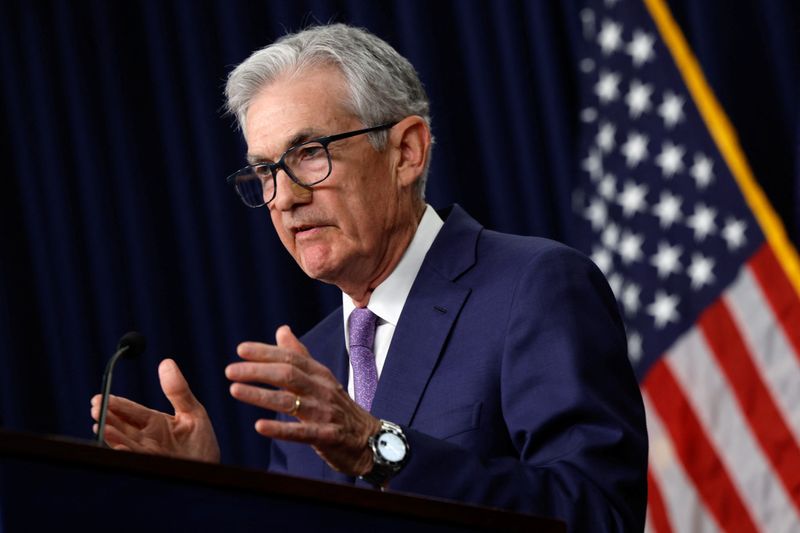Investing.com -- Federal Reserve Chair Jerome Powell is navigating familiar territory as he heads into 2025, aiming to balance the central bank’s independence while avoiding confrontation with Donald Trump.
Powell’s challenge lies in managing monetary policy without appearing to preemptively counter potential inflationary pressures from the incoming administration’s policies.
The balancing act has been evident in recent months. Shortly after Trump’s election victory in November, Powell emphasized that the Fed wouldn’t speculate on how future policies might influence interest rates.
“We don’t guess, we don’t speculate, and we don’t assume,” Powell said on Nov. 7. However, the Fed’s latest projections suggest some officials are already accounting for policy changes, signaling fewer rate cuts in 2025 due to inflation concerns.
Last week, the Fed cut rates by a quarter point, completing a full percentage point reduction since September. Despite this, updated forecasts revealed a more cautious stance on easing.
Most officials now anticipate only two cuts next year, down from four projected in September. Inflation is expected to remain at 2.5% in 2025, up from earlier forecasts of 2.2%. Notably, 15 of 19 Fed officials see a risk that inflation could exceed projections.
Michael Gapen, chief U.S. economist at Morgan Stanley (NYSE:MS), noted the shift. The latest meeting “came out much more hawkish than we thought because they did what they said they weren’t going to do: They said they weren’t going to speculate on policies and then a month later they decided to speculate on policies,” he said.
A key factor behind this caution is Trump’s proposed economic agenda, which includes tariffs and stricter immigration policies. Tariffs could drive prices higher, while tighter border controls might constrain labor supply, increasing wages. Powell has downplayed the direct impact of Trump’s election on inflation forecasts, attributing the shift to recent inflation data instead.
Despite this, Powell has, according to the Wall Street Journal, privately advised colleagues to tread carefully in public remarks to avoid perceptions of political bias. This approach aligns with Powell’s efforts to maintain the Fed’s reputation for apolitical, data-driven decision-making.
The stakes are high. Powell recalls the Fed’s experience during Trump’s first term when trade wars led to rate cuts. Yet the current environment differs. Inflation has been elevated, unlike the low-inflation backdrop of 2018. Powell highlighted this distinction at his Dec. 18 press conference, referencing past internal Fed analyses.
“What the committee’s doing now is discussing pathways and understanding again the ways in which tariffs can affect inflation and the economy,” said Powell. “It puts us in position, when we finally do see what the actual policies are, to make a more careful, thoughtful assessment of what might be the appropriate policy response.”
Trump’s advisors argue that deregulation and increased energy production could offset inflationary risks. Treasury secretary-designate Scott Bessent downplayed concerns.
“Tariffs can’t be inflationary because if the price of one thing goes up, unless you give people more money, then they have less money to spend on the other thing, so there is no inflation,” he said on a radio program hosted by Larry Kudlow, a former Trump adviser.
Still, analysts believe the Fed will respond cautiously if supply-side improvements reverse.
“In this environment, you’re not coming from six years of below-target inflation. You’re coming from a few years of being well above target,” notes JPMorgan’s chief economist Michael Feroli.
Other analysts suggest that the economic environment will significantly influence how much businesses pass rising costs to consumers.
Economist Ray Farris believes that with full employment, cost increases are more likely to be passed through than during a downturn. He also highlights the uncertainty around how quickly companies adjust prices, explaining that gradual increases could make inflation appear more persistent to the public.
